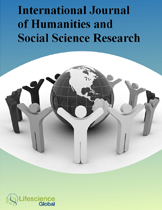ijhssr
Abstract : “It Puts us in our Students’ Shoes”: Listening to Voices from Teacher Candidates on Their Test-Taking Experience
|
|
|
Abstract: This study explores teacher candidates’ experiential learning through their test-taking experiences while attending a Bachelor of Education (B. Ed.) program. Eighty-four written reflections by teacher candidates taking a mid-term course examination on classroom assessment practices were analyzed. Major themes emerging from these reflections on the test-taking experience are related to validity concepts of construct representation, construct-irrelevant variance, relevance, and fairness. The study reveals that the test-taking experience could be valuable to teacher candidates in their learning of classroom assessment practices and in their understanding of the issues in test taking that may influence test performance. This, in turn, could potentially provide teacher candidates with a direct framework for their future classroom assessment practices, by which they may support their own future students. Keywords: Test-taking experience, classroom assessment practices, classroom assessment tools, teacher education. |
Abstract : Relationships between Personality and Burn-Out: An Empirical Study with Helping Professions’ Workers
|
|
|
Abstract: Stress-related illnesses, such as burnout, had an increase over the last decade, even though not every employee, in the same workplace, shows burnout symptoms, suggesting that individual factors may contribute to this phenomenon. In fact, even though research on burnout generally has tended to explore the organizational factors associated with this condition, which play certainly an important role, however we cannot ignore the relationship between burnout and personality. This study explored the relationship between personality and burn-out in 144 helping professions’ workers. Personality was measured by the Big Five Questionnaire; burn-out was measured by the Link Burn-out Questionnaire. Results confirm a relationship between the two constructs, partially supporting previous research that explained burn-out not only by organizational factors, but also by individual dimensions. Keywords: Work-related stress, helping professions, Big Five model, burnout. |
Abstract : The Limits of Scientific Gaze: Exploring the Contradictions of Contagion, 2011
|
|
|
Abstract: This essay explores the synopsis of the film Contagion (2011) that narrates the ethical dilemma of sacrifice in a post-disaster context. At first glance, it seems to emulate the situation during Swine flu outbreaks, radicalizing the political discourse in two directions. On one hand, China, a new emerging but undemocratic superpower, is portrayed as dangerous, disordered, and the Chinese as lazy. In the movie, the United States government intervenes to maintain the security of world health. The US intervention entails restricting the rights of democratic life such as mobility, trade, connectivity, and the distribution of food. The implication is that mobility and tourism facilitate virus outbreaks. This movie presents an ethnocentric discourse because it assumes that only mobility in the First world is safe. Global connections which enable the introduction of Third World from presumed uncivilized cultures lead to the possibility of apocalyptic pandemics. Keywords: Mobilities, tourism, Virus, Death, Disasters, Pandemics. |
Abstract : The Influence of Delay and Item Difficulty in Criminal Justice Systems on Eyewitness Confidence and Accuracy
|
|
|
Abstract: There is international concern about the negative effects of delays in Criminal Justice Systems. Problems include the deleterious effects that delay can have on witnesses’ memory accuracy and witnesses’ ability to calibrate their memories accurately. Little empirical work has been conducted on these issues combined with item difficulty and the relationship between accuracy and confidence. This paper investigates these issues. 21 witnesses were interviewed about an observed crime and required to answer lawyerly questions used in cross-examination relating to target items classified as ‘easy’, ‘moderate’ and ‘difficult’, in terms of memorability. Participants were interviewed again, 6 months later. A 6 month delay significantly reduced memory accuracy for all levels of question difficulty. Within-subjects C-A relationships seemed to be relatively unaffected by delay; i.e. they tended to be positive for easy and moderate items, and negative for difficult items. Between-subjects C-A relationships were also positive for both easy and moderate items, but improved after 6 months; whereas C-A relationships for the difficult items remained negative and statistically insignificant following the 6 month delay. Delay can have a profound negative effect on witness accuracy that is not likely to be compensated for by improvements in C-A calibration. Keywords: Criminal justice, delay, witness, confidence, accuracy. |























